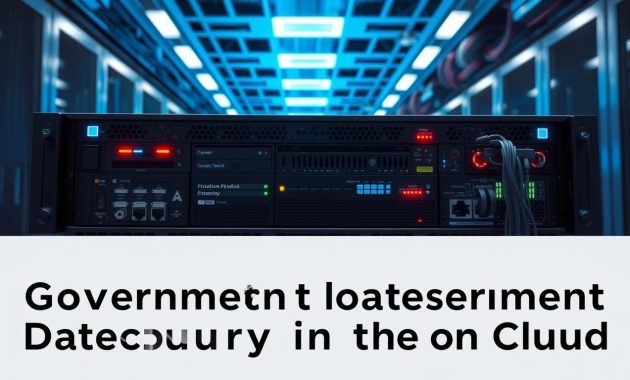In the realm of government agencies, the imperative to safeguard data is paramount. The advent of cloud server solutions necessitates a meticulous examination of cloud server considerations to guarantee government data security. It is imperative to assess cloud server solutions that align with your agency’s unique requirements, thereby establishing a secure milieu for your critical data.
The selection of a cloud server provider must be guided by a prioritization of government data security. This entails a thorough evaluation of the potential risks and benefits associated with cloud server solutions. Such an approach ensures the preservation of data security and integrity, while also fulfilling regulatory compliance mandates.
Understanding Government Data Security Challenges
In the intricate realm of government data security, grasping the complexities is paramount. The hurdles are diverse, encompassing cloud server security and the perpetual menace of data breaches. A report by the Cybersecurity and Infrastructure Security Agency (CISA) elucidates the array of cyber threats confronting government entities. These include phishing, ransomware, and denial-of-service attacks.
The repercussions of these threats are profound, extending to financial losses, reputational harm, and jeopardized national security. To counteract these perils, government agencies must accentuate cloud server security and deploy stringent countermeasures against data breaches. This necessitates adherence to regulatory mandates, such as the Federal Information Security Management Act (FISMA) and the Health Insurance Portability and Accountability Act (HIPAA).
By comprehending the Government data security challenges and proactively addressing them, government agencies can fortify the safeguarding of their sensitive data. This entails a commitment to cloud server security and the implementation of efficacious strategies to avert data breaches.
Key Considerations for Cloud Server Security
In the realm of cloud computing, the security of government data is paramount. Evaluating cloud service providers necessitates a thorough examination of their security protocols. This includes their encryption methods, access control mechanisms, and user permission frameworks. The National Institute of Standards and Technology (NIST) offers comprehensive guidelines for assessing cloud service providers, facilitating informed decision-making.
Data encryption stands as a cornerstone of cloud server security, safeguarding sensitive government information during both transmission and storage. It is imperative to select cloud service providers that employ advanced encryption techniques, such as end-to-end encryption. This ensures that your data remains impervious to unauthorized access. Furthermore, robust access control and user permission systems are critical, ensuring that only authorized personnel can access sensitive data.

- Security certifications and compliance with federal standards
- Data encryption methods and protocols
- Access control and user permission policies
- Incident response and disaster recovery plans
By meticulously evaluating these elements and prioritizing data encryption, access control, and user permissions, you can safeguard your government data in the cloud. This approach ensures collaboration with a cloud service provider that values cloud server security above all else.
Compliance with Federal Standards
In the intricate realm of government data security, the imperative of adhering to federal standards cannot be overstated. The Federal Information Security Management Act (FISMA) mandates that government entities deploy information security controls to safeguard sensitive data. This necessitates strict adherence to the guidelines stipulated by the National Institute of Standards and Technology (NIST), which serves as a blueprint for fortifying government data security.
The compliance with federal standards, such as FISMA and NIST, is paramount for the protection of government data in the cloud environment. Moreover, entities handling protected health information must conform to the Health Insurance Portability and Accountability Act (HIPAA).
Key Federal Standards
- FISMA: Requires government agencies to implement information security controls to protect sensitive data
- NIST: Provides guidelines for implementing information security controls
- HIPAA: Regulates the handling of protected health information
Transparency in cloud operations is of utmost importance to verify compliance with federal standards. By prioritizing adherence to these standards, government agencies can guarantee the security and integrity of their data. This, in turn, reinforces public trust in their operations.
Implementing Robust Risk Management Strategies
In the realm of cloud-based government data security, the implementation of robust risk management strategies is paramount. This necessitates a proactive stance towards identifying and mitigating potential threats. Such an approach ensures the confidentiality, integrity, and availability of sensitive information. Risk management is an ongoing endeavor, requiring continuous monitoring and evaluation of potential risks.
A comprehensive risk assessment is indispensable for identifying potential vulnerabilities and threats. This involves evaluating the likelihood and potential impact of various risks, enabling the prioritization and addressing of the most significant threats. The NIST Cybersecurity Framework offers guidelines for conducting a thorough risk assessment, aiding in the development of a robust risk management strategy. Effective risk management also encompasses incident response, facilitating quick and effective responses to security incidents.

Key considerations for implementing robust risk management strategies include:
- Conducting regular risk assessments to identify potential vulnerabilities and threats
- Developing an incident response plan to ensure quick and effective response to security incidents
- Implementing measures to prevent and detect cyber threats, such as encryption and access controls
By prioritizing risk management and incident response, you can safeguard government data in the cloud and ensure the security and integrity of sensitive information. Effective risk management strategies enable you to stay ahead of emerging threats, thereby maintaining the trust of citizens and stakeholders.
Best Practices for User Training and Awareness
In the realm of cloud-based data security for government entities, the significance of user training and awareness cannot be overstated. By imparting knowledge on data security protocols, such as password management and phishing detection, the risk of security breaches is markedly diminished. The Department of Homeland Security (DHS) offers indispensable resources to bolster these initiatives, enabling employees to actively safeguard sensitive information.
The cornerstone of a robust security culture within your organization lies in the implementation of effective user training. This encompasses not only the dissemination of data security best practices but also the cultivation of a critical mindset towards potential threats. Such an approach empowers employees to identify and report suspicious activities, thereby preventing security breaches.
To realize this vision, consider integrating regular security awareness training sessions into your organizational framework. These sessions should be meticulously crafted to address pertinent data security concerns and threats. By doing so, employees will grasp the critical role of user training in fortifying your organization’s security posture. Prioritizing security awareness and user training is pivotal in bolstering cloud-based data security and mitigating the likelihood of security incidents.
Future Trends in Cloud Server Technologies
As cloud server technologies continue to evolve, government agencies must stay attuned to the latest advancements to maintain robust data security. The rise of artificial intelligence (AI) and machine learning (ML) is expected to play a pivotal role in enhancing cloud server security. These technologies can help detect and respond to security incidents more quickly and effectively, providing an extra layer of protection for your critical data.
Moreover, blockchain technology is also being explored for its potential to improve transparency and security in cloud operations. By leveraging the decentralized and immutable nature of blockchain, you can ensure that your cloud server activities are transparent and tamper-proof, further bolstering your cybersecurity measures.
As cybersecurity regulations continue to evolve, it is crucial that you stay informed and prepared to adapt your cloud server solutions accordingly. By proactively addressing these emerging trends, you can ensure that your government data remains secure and compliant, safeguarding the public’s trust and the integrity of your operations.
